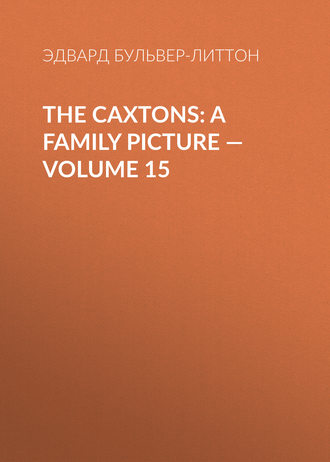
Эдвард Бульвер-Литтон
The Caxtons: A Family Picture — Volume 15
"My lord! this from you to me is an honor that—"
"You will not take my hand? Then, believe me, it is not I that will give that grief to your heart."
Touched, penetrated, melted, by this generosity in a man of such lofty claims, to one of my age and fortunes, I pressed that noble hand, half raising it to my lips,—an action of respect that would have misbecome neither; but he gently withdrew the hand, in the instinct of his natural modesty. I had then no heart to speak further on such a subject, but faltering out that I would go and see my uncle, I took up the light and ascended the stairs. I crept noiselessly into Roland's room, and shading the light, saw that, though he slept, his face was very troubled. And then I thought, "What are my young griefs to his?" and sitting beside the bed, communed with my own heart and was still.
CHAPTER III
At sunrise I went down into the sitting-room, having resolved to write to my father to join us; for I felt how much Roland needed his comfort and his counsel, and it was no great distance from the old Tower. I was surprised to find Lord Castleton still seated by the fire; he had evidently not gone to bed.
"That's right," said he; "we must encourage each other to recruit nature;" and he pointed to the breakfast-things on the table.
I had scarcely tasted food for many hours, but I was only aware of my own hunger by a sensation of faintness. I ate unconsciously, and was almost ashamed to feel how much the food restored me.
"I suppose," said I, "that you will soon set off to Lord N—'s?"
"Nay, did I not tell you that I have sent Summers express, with a note to Lady Ellinor begging her to come here? I did not see, on reflection, how I could decorously accompany Miss Trevanion alone, without even a female servant, to a house full of gossiping guests. And even had your uncle been well enough to go with us, his presence would but have created an additional cause for wonder; so as soon as we arrived, and while you went up with the Captain, I wrote my letter and despatched my man. I expect Lady Ellinor will be here before nine o'clock. Meanwhile I have already seen that infamous waiting-woman, and taken care to prevent any danger from her garrulity. And you will be pleased to hear that I have hit upon a mode of satisfying the curiosity of our friend Mrs. Grundy—that is,'the World'—without injury to any one. We must suppose that that footman of Trevanion's was out of his mind,—it is but a charitable, and your good father would say a philosophical, supposition. All great knavery is madness! The world could not get on if truth and goodness were not the natural tendencies of sane minds. Do you understand?"
"Not quite."
"Why, the footman, being out of his mind, invented this mad story of Trevanion's illness, frightened Lady Ellinor and Miss Trevanion out of their wits with his own chimera, and hurried them both off, one after the other. I, having heard from Trevanion, and knowing he could not have been ill when the servant left him, set off, as was natural in so old a friend of the family, saved her from the freaks of a maniac,—who, getting more and more flighty, was beginning to play the Jack o' Lantern, and leading her, Heaven knows where, over the country,—and then wrote to Lady Ellinor to come to her. It is but a hearty laugh at our expense, and Mrs. Grundy is content. If you don't want her to pity or backbite, let her laugh. She is a she-Cerberus,—she wants to eat you; well stop her mouth with a cake.
"Yes," continued this better sort of Aristippus, so wise under all his seeming levities, "the cue thus given, everything favors it. If that rogue of a lackey quoted Shakspeare as much in the servants' hall as he did while I was binding him neck and heels in the kitchen, that's enough for all the household to declare he was moon-stricken; and if we find it necessary to do anything more, why, we must induce him to go into Bedlam for a month or two. The disappearance of the waiting-woman is natural; either I or Lady Ellinor send her about her business for her folly in being so gulled by the lunatic. If that's unjust, why, injustice to servants is common enough, public and private; neither minister nor lackey can be forgiven if he help us into a scrape. One must vent one's passion on something. Witness my poor cane,—though, indeed, a better illustration would be the cane that Louis XIV. broke on a footman because his Majesty was out of humor with the prince, whose shoulders were too sacred for royal indignation."
"So you see," concluded Lord Castleton, lowering his voice, "that your uncle, amongst all his other causes of sorrow, may think at least that his name is spared in his son's. And the young man himself may find reform easier when freed from that despair of the possibility of redemption which Mrs. Grundy inflicts upon those who—Courage, then; life is long!"
"My very words!" I cried; "and so repeated by you, Lord Castleton, they seem prophetic."
"Take my advice, and don't lose sight of your cousin while his pride is yet humbled, and his heart perhaps softened. I don't say this only for his sake. No, it is your poor uncle I think of,—noble old fellow! And now I think it right to pay Lady Ellinor the respect of repairing, as well as I can, the havoc three sleepless nights have made on the exterior of a gentleman who is on the shady side of remorseless forty."
Lord Castleton here left me, and I wrote to my father, begging him to meet us at the next stage (which was the nearest point from the high road to the Tower), and I sent off the letter by a messenger on horseback. That task done, I leaned my head upon my hand, and a profound sadness settled upon me, despite all my efforts to face the future and think only of the duties of life—not its sorrows.
CHAPTER IV
Before nine o'clock Lady Ellinor arrived, and went straight into Miss Trevanion's room; I took refuge in my uncle's. Roland was awake and calm, but so feeble that he made no effort to rise; and it was his calm, indeed, that alarmed me the most,—it was like the calm of nature thoroughly exhausted. He obeyed me mechanically, as a patient takes from your hand the draught, of which he is almost unconscious, when I pressed him to take food. He smiled on me faintly when I spoke to him, but made me a sign that seemed to implore silence. Then he turned his face from me and buried it in the pillow; and I thought that he slept again, when, raising himself a little, and feeling for my hand, he said, in a scarcely audible voice,—
"Where is he?"
"Would you see him, sir?"
"No, no; that would kill me,—and then what would become of him?"
"He has promised me an interview, and in that interview I feel assured he will obey your wishes, whatever they are." Roland made no answer.
"Lord Castleton has arranged all, so that his name and madness (thus let us call it) will never be known."
"Pride, pride, pride still!" murmured the old soldier. "The name, the name,—well, that is much; but the living soul!—I wish Austin were here."
"I have sent for him, sir."
Roland pressed my hand, and was again silent. Then he began to mutter, as I thought, incoherently about the Peninsula and obeying orders; and how some officer woke Lord Wellington at night and said that something or other (I could not catch what,—the phrase was technical and military) was impossible; and how Lord Wellington asked, "Where's the order-book?" and looking into the order-book, said, "Not at all impossible, for it is in the order-book;" and so Lord Wellington turned round and went to sleep again. Then suddenly Roland half rose, and said, in a voice clear and firm, "But Lord Wellington, though a great captain, was a fallible man, sir, and the order-book was his own mortal handiwork. Get me the Bible!"
Oh, Roland, Roland! and I had feared that thy mind was wandering!
So I went down and borrowed a Bible in large characters, and placed it on the bed before him, opening the shutters and letting in God's day upon God's word.
I had just done this when there was a slight knock at the door. I opened it, and Lord Castleton stood without. He asked me, in a whisper, if he might see my uncle. I drew him in gently, and pointed to the soldier of life "learning what was not impossible" from the unerring Order-Book.
Lord Castleton gazed with a changing countenance, and without disturbing my uncle, stole back. I followed him, and gently closed the door.
"You must save his son," he said in a faltering voice,—"you must; and tell me how to help you. That sight,—no sermon ever touched me more! Now come down and receive Lady Ellinor's thanks. We are going. She wants me to tell my own tale to my old friend Mrs. Grundy; so I go with them. Come!"
On entering the sitting-room, Lady Ellinor came up and fairly embraced me. I need not repeat her thanks, still less the praises, which fell cold and hollow on my ear. My gaze rested on Fanny where she stood apart,—her eyes, heavy with fresh tears, bent on the ground. And the sense of all her charms; the memory of the tender, exquisite kindness she had shown to the stricken father; the generous pardon she had extended to the criminal son; the looks she had bent upon me on that memorable night (looks that had spoken such trust in my presence), the moment in which she had clung to me for protection, and her breath been warm upon my cheek,—all these rushed over me, and I felt that the struggle of months was undone, that I had never loved her as I loved her then, when I saw her but to lose her evermore! And then there came for the first, and, I now rejoice to think, for the only time, a bitter, ungrateful accusation against the cruelty of fortune and the disparities of life. What was it that set our two hearts eternally apart and made hope impossible? Not nature, but the fortune that gives a second nature to the world. Ah, could I then think that it is in that second nature that the soul is ordained to seek its trials, and that the elements of human virtue find their harmonious place? What I answered I know not. Neither know I how long I stood there listening to sounds which seemed to have no meaning, till there came other sounds which indeed woke my sense and made my blood run cold to hear,—the tramp of the horses, the grating of the wheels, the voice at the door that said all was ready.
Then Fanny lifted her eyes, and they met mine; and then involuntarily and hastily she moved a few steps towards me, and I clasped my right hand to my heart, as if to still its beating, and remained still. Lord Castleton had watched us both. I felt that watch upon us, though I had till then shunned his looks; now, as I turned my eyes from Fanny's, that look came full upon me,—soft, compassionate, benignant. Suddenly, and with an unutterable expression of nobleness, the marquis turned to Lady Ellinor and said: "Pardon me for telling you an old story. A friend of mine—a man of my own years—had the temerity to hope that he might one day or other win the affections of a lady young enough to be his daughter, and whom circumstances and his own heart led him to prefer from all her sex. My friend had many rivals; and you will not wonder, for you have seen the lady. Among them was a young gentleman who for months had been an inmate of the same house (hush, Lady Ellinor! you will hear me out; the interest of my story is to come), who respected the sanctity of the house he had entered, and had left it when he felt he loved, for he was poor, and the lady rich. Some time after, this gentleman saved the lady from a great danger, and was then on the eve of leaving England (hush! again, hush!). My friend was present when these two young persons met, before the probable absence of many years, and so was the mother of the lady to whose hand he still hoped one day to aspire. He saw that his young rival wished to say, 'Farewell!' and without a witness; that farewell was all that his honor and his reason could suffer him to say. My friend saw that the lady felt the natural gratitude for a great service, and the natural pity for a generous and unfortunate affection; for so, Lady Ellinor, he only interpreted the sob that reached his ear! What think you my friend did? Your high mind at once conjectures. He said to himself: 'If I am ever to be blest with the heart which, in spite of disparity of years, I yet hope to win, let me show how entire is the trust that I place in its integrity and innocence; let the romance of first youth be closed, the farewell of pure hearts be spoken, unembittered by the idle jealousies of one mean suspicion.' With that thought, which you, Lady Ellinor, will never stoop to blame, he placed his hand on that of the noble mother, drew her gently towards the door, and calmly confident of the result, left these two young natures to the unwitnessed impulse of maiden honor and manly duty."







